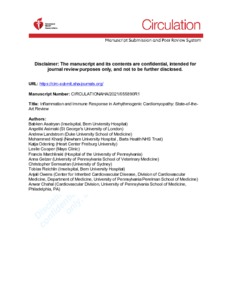Asatryan, B;
Asimaki, A;
Landstrom, AP;
Khanji, MY;
Odening, KE;
Cooper, LT;
Marchlinski, FE;
Gelzer, AR;
Semsarian, C;
Reichlin, T;
et al.
Asatryan, B; Asimaki, A; Landstrom, AP; Khanji, MY; Odening, KE; Cooper, LT; Marchlinski, FE; Gelzer, AR; Semsarian, C; Reichlin, T; Owens, AT; Chahal, CAA
(2021)
Inflammation and Immune Response in Arrhythmogenic Cardiomyopathy: State-of-the-Art Review.
Circulation, 144 (20).
pp. 1646-1655.
ISSN 1524-4539
https://doi.org/10.1161/CIRCULATIONAHA.121.055890
SGUL Authors: Asimaki, Angeliki
![[img]](https://openaccess.sgul.ac.uk/113894/14.hassmallThumbnailVersion/417055_1_merged_1630521815.pdf)  Preview |
|
PDF
Accepted Version
Available under License ["licenses_description_publisher" not defined].
Download (2MB)
| Preview
|
Abstract
Arrhythmogenic cardiomyopathy (ACM) is a primary disease of the myocardium, predominantly caused by genetic defects in proteins of the cardiac intercalated disc, particularly, desmosomes. Transmission is mostly autosomal dominant with incomplete penetrance. ACM also has wide phenotype variability, ranging from premature ventricular contractions to sudden cardiac death and heart failure. Among other drivers and modulators of phenotype, inflammation in response to viral infection and immune triggers have been postulated to be an aggravator of cardiac myocyte damage and necrosis. This theory is supported by multiple pieces of evidence, including the presence of inflammatory infiltrates in more than two-thirds of ACM hearts, detection of different cardiotropic viruses in sporadic cases of ACM, the fact that patients with ACM often fulfill the histological criteria of active myocarditis, and the abundance of anti-desmoglein-2, antiheart, and anti-intercalated disk autoantibodies in patients with arrhythmogenic right ventricular cardiomyopathy. In keeping with the frequent familial occurrence of ACM, it has been proposed that, in addition to genetic predisposition to progressive myocardial damage, a heritable susceptibility to viral infections and immune reactions may explain familial clustering of ACM. Moreover, considerable in vitro and in vivo evidence implicates activated inflammatory signaling in ACM. Although the role of inflammation/immune response in ACM is not entirely clear, inflammation as a driver of phenotype and a potential target for mechanism-based therapy warrants further research. This review discusses the present evidence supporting the role of inflammatory and immune responses in ACM pathogenesis and proposes opportunities for translational and clinical investigation.
| Item Type: |
Article
|
| Additional Information: |
This is a non-final version of an article published in final form in Asatryan, B; Asimaki, A; Landstrom, AP; Khanji, MY; Odening, KE; Cooper, LT; Marchlinski, FE; Gelzer, AR; Semsarian, C; Reichlin, T; et al. (2021) Inflammation and Immune Response in Arrhythmogenic Cardiomyopathy: State-of-the-Art Review. Circulation, 144 (20). pp. 1646-1655. |
| Keywords: |
arrhythmias, cardiac, arrhythmogenic right ventricular dysplasia, autoimmunity, death, sudden, cardiac, genetics, inflammation, myocarditis, Cardiovascular System & Hematology, 1103 Clinical Sciences, 1102 Cardiorespiratory Medicine and Haematology, 1117 Public Health and Health Services |
| SGUL Research Institute / Research Centre: |
Academic Structure > Molecular and Clinical Sciences Research Institute (MCS) |
| Journal or Publication Title: |
Circulation |
| ISSN: |
1524-4539 |
| Language: |
eng |
| Publisher License: |
Publisher's own licence |
| Projects: |
|
| PubMed ID: |
34780255 |
| Dates: |
| Date |
Event |
| 2021-11-16 |
Published |
| 2021-11-15 |
Published Online |
| 2021-11-15 |
Accepted |
|
 |
Go to PubMed abstract |
| URI: |
https://openaccess.sgul.ac.uk/id/eprint/113894 |
| Publisher's version: |
https://doi.org/10.1161/CIRCULATIONAHA.121.055890 |
Statistics
Item downloaded times since 02 Dec 2021.
Actions (login required)
 |
Edit Item |



